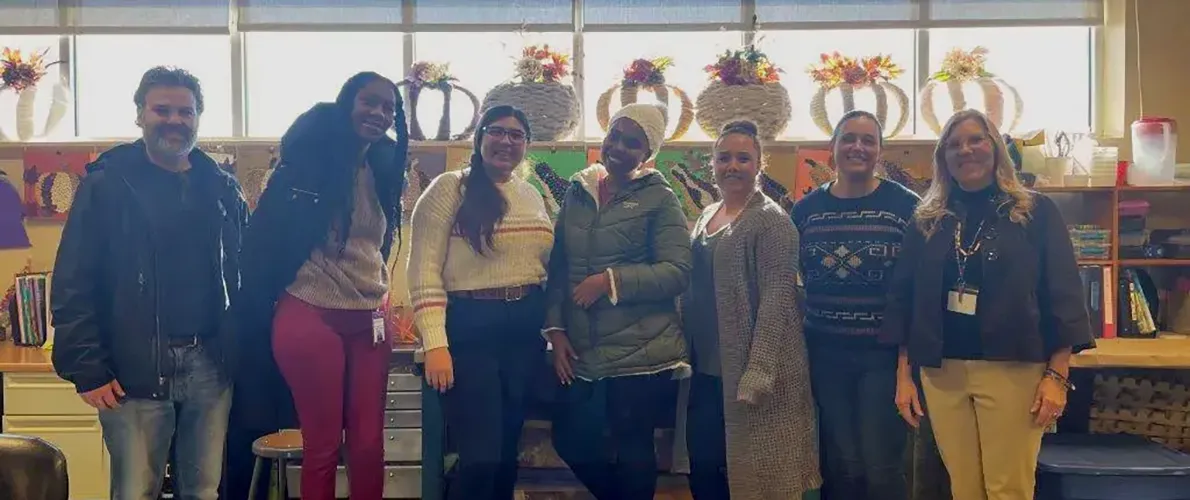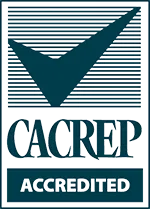Main Content
Learning Objectives

Mission
The Counseling and Rehabilitation Education (CARE) program promotes the professional development of graduate students to prepare them to provide ethical, culturally inclusive practices that sustain and empower those using counseling services. To meet the mission statement, faculty commit to:
- Staff professionalism: pledging to maintain rigorous standards for education, training, and clinical practice.
- Respect for others: demonstrating an appreciation for the uniqueness and cultural differences of each individual.
- Relevance in teaching: learning experiences will reflect evidence-based practices, they will be relevant, and be purposeful.
- Innovation in learning: Graduate students develop understanding through inquiry, the use of new technologies, creative problem-solving, and critical thinking skills.
- Expanding graduate student potential: Learning experiences will promote the emotional, relational, and academic potential of all graduate students.
- Training Videos
- Training Documents
CACREP Accreditation
 The Counseling and Rehabilitation Education program is accredited through the Council for Accreditation of Counseling and Related Educational Programs (CACREP).
The Counseling and Rehabilitation Education program is accredited through the Council for Accreditation of Counseling and Related Educational Programs (CACREP).
500 Montgomery Street, Suite 350
Alexandria, VA 22314
www.cacrep.org
Reports
- Annual Report (pdf)
- Program Evaluation (pdf)
- Student Survey (pdf)
Student Learning Objectives
Professional Counseling Orientation and Ethical Practice
Program Objective 1. CARE graduates demonstrate the content knowledge and dispositions necessary to be effective, ethical Caressers and social justice advocates in their specialty area.
Student Learning Outcome # 1: Students will demonstrate an understanding of the Counseling profession, develop an identity as a professional counselor, and abide by the Counseling-related legal and ethical guidelines
Related CACREP Standards: 2.F.1.e. Advocacy processes needed to address institutional and
social barriers that impede access, equity, and success for clients
2. F.1.i. Ethical standards of professional Counseling organizations and credentialing bodies, and applications of ethical and legal considerations in professional Counseling.
2. F.1.j Technology impact on the Counseling profession
Social and Cultural Diversity
Program Objective # 2: Students will demonstrate the ability to reflect upon their attitudes, appreciations, values, and biases; and apply theories and models of multicultural Counseling and social justice within the classroom, community, and internship setting.
Student Learning Outcome/KPI #2: CARE graduates appropriately respond to the unique combination of cultural variables, including ability, age, beliefs, ethnicity, gender, gender identity, race, level of acculturation, and socioeconomic status, that influence the Counseling process.
Related CACREP Standards: 2.F.2.b Theories and models of multicultural Counseling, cultural identity development, and social justice and advocacy.
2. F.2.c multicultural Counseling competencies; 2F.2.f. The effects of power and privilege for Counselors and clients.
Human Growth and Development
Program Objective #3: CARE graduates understand that human development occurs in critical contexts that are influenced by a person’s race, ethnicity, religion, and factors such as poverty, loss, developmental and physical trauma, and access to resources.
Student Learning Outcome/KPI # 3: Students will demonstrate the application of lifespan development and the capacity to integrate the knowledge of developmental theory into practice with client case conceptualization.
Related to CACREP Standards: 2.F.3.a. Theories of individual and family development across the lifespan, 2.F.3.g effects of crisis, disasters, and trauma on diverse individuals across the lifespan
2. F.3.h a general framework for understanding differing abilities and strategies for differentiated interventions.
Career Development
Program Objective # 4: CARE graduates view the career decision-making process as developmentally influenced and individually determined.
Student Learning Outcome # 4 Students will demonstrate the ability to assess individual interests, strengths, values, and skills using major career development theories.
Related CACREP Standards: 2.F.4.i. Methods of identifying and using assessment tools and techniques relevant to career planning and decision making
Counseling and Helping Relationships
Program Objective #5: CARE graduates value the influence of a strong working alliance built upon honesty and trust in achieving success in the therapeutic relationship.
Student Learning Outcome # 5: Students will demonstrate an ability to integrate professional Counseling theory, interpersonal skills, and a person-centered focus in creating treatment plans and case management conceptualizations.
Related CACREP Standards: 2.F.5.a. Theories and models of Counseling
2. F.5.d ethical and culturally relevant strategies for establishing and maintaining in-person and technology-assisted relationships, 2.5.n processes for aiding students in developing a personal model of counseling
Group Counseling and Group Work
Program Objective # 6: CARE graduates differentiate between group counseling theories and utilize effective interventions and leadership skills in facilitating various types of groups.
Student Learning Outcome/KPI #6: Students will demonstrate an understanding of the group Counseling process, including theories of group development, group dynamics, the application of group Counseling theories, and group leadership and management skills.
Related CACREP Standards: 2.F.6.a. theoretical foundations of group counseling and group work, 2.F.6.b. dynamics associated with group process and development, and 2.F.6.h direct experiences, 10 hours over one term.
Assessment and Testing
Program Objective #7: CARE graduates maintain an understanding of developmentally and culturally appropriate approaches to assessment and testing.
Student Learning Outcome # 7: Students will demonstrate a broad understanding of tests and assessment instruments by selecting, administering, and interpreting test results, using appropriate techniques and multiple formats, in an ethical and culturally relevant manner.
Related CACREP Standards: 2.F.7.c. Procedures for assessing the risk of aggression or danger to others, self-inflicted harm, or suicide; 2. F.d Procedures for identifying trauma and abuse and reporting for abuse; 2. F.e use of assessments for diagnostic and intervention planning purposes,
2. F.7.i. Use of assessments relevant to academic/educational, career, persona, and social development
Research and Program Evaluation
Program Objective #8: CARE graduates value the use of statistically supported, evidence-based psychoeducational, and psychotherapeutic interventions in their practice.
Student Learning Outcome # 8: Students will demonstrate the ability to analyze and evaluate the empirical literature related to the field of Counseling for appropriate methodology and well-supported findings.
Related CACREP Standards: 2. F.8. e. Evaluation of counseling interventions and programs 2.F.8.j. ethically and culturally relevant strategies for conducting, interpreting, and reporting the results of research and/or program evaluation
Program Goals
Faculty in the program recognize the uniqueness of human beings and are dedicated to helping graduate students obtain the knowledge, skills, and experiences necessary to work with a wide range of clientele. Through a combination of course and clinical experiences, SIU CARE graduates will demonstrate the behaviors and possess the attributes which are required of competent, professional counselors:- CARE graduates demonstrate the content knowledge and dispositions necessary to be effective counselors and social justice advocates in their specialty areas.
- CARE graduates appropriately respond to the unique combination of cultural variables, including ability, age, beliefs, ethnicity, gender, gender identity, race, level of acculturation, and socioeconomic status, that influence the counseling process.
- CARE graduates understand that human development occurs in critical contexts that are influenced by a person’s race, ethnicity, religion, and factors such as poverty, loss, developmental and physical trauma, and access to resources.
- CARE graduates conceptualize the career decision-making process as developmentally influenced, and individually determined.
- CARE graduates value the influence of a strong working alliance built upon honesty and trust, in achieving success in the therapeutic relationship.
- CARE graduates differentiate between theories of group counseling and utilize effective interventions and leadership skills in facilitating several types of groups.
- CARE graduates possess an understanding of developmentally and culturally appropriate approaches to assessment and testing.
- CARE graduates value the use of statistically supported, evidence-based psychoeducational and psychotherapeutic interventions in their practice.
- CARE graduates who specialize in clinical mental health counseling promote the development of healthy coping capacities and support systems, for individuals who identify as a person with mental illnesses, to assist them in improving their quality of life.
- CARE graduates who specialize in clinical rehabilitation counseling advocate for the removal of functional, environmental, and social barriers that impede self-sufficiency and reduce the quality of life, for persons who identify as an individual with a disability.
Program Objectives
- CARE graduates possess the content knowledge and dispositions necessary to be effective counselors and social justice advocates in their specialty area
- CARE graduates appropriately respond to the unique combination of cultural variables, including ability, age, beliefs, ethnicity, gender, gender identity, race, level of acculturation, and socioeconomic status, that influence the counseling process.
- CARE graduates understand that human development occurs in critical contexts influenced by a person’s race, ethnicity, religion, and factors such as poverty, loss, developmental and physical trauma, and access to resources.
- CARE graduates conceptualize the career decision-making process as developmentally influenced and individually determined.
- CARE graduates value the influence of a strong working alliance built upon honesty and trust in achieving success in the therapeutic relationship.
- CARE graduates differentiate between group counseling theories and utilize effective interventions and leadership skills in facilitating various types of groups.
- CARE graduates maintain an understanding of developmentally and culturally appropriate approaches to assessment and testing.
- CARE graduates value the use of statistically supported, evidence-based psychoeducational, and psychotherapeutic interventions in their practice.
- CARE graduates who specialize in clinical mental health counseling promote healthy coping capacities and support systems for individuals who identify as persons with mental illnesses to assist them in improving their quality of life.
- CARE graduates who specialize in clinical rehabilitation counseling advocate for removing functional, environmental, and social barriers that impede self-sufficiency and reduce the quality of life for persons who identify as an individual with a disability.



